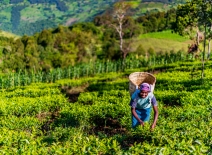
In February 2023, a BBC documentary aired evidence and testimony of workers alleging sexual abuse and harassment of workers in companies and tea estates, including James Finlay Kenya (JFK) (now Browns Plantation Kenya – BPK).
Partner Africa was commissioned by JFK to conduct an independent investigation. ETI chaired a steering group, consisting of buyers and a local NGO, tasked with overseeing the investigation.
This work should be done through genuine and ongoing consultation with survivors, workers and their representatives, the local community, and local civil society organisations. For change to be meaningful and sustainable it is critical that a thoughtful process of stakeholder engagement is undertaken, strengthening these relationships, and building trust. This starts with the acknowledgement of responsibility and a clear communication of the findings, recommendations and intended actions, the latter with an opening for dialogue in design and implementation.
Peter McAllister, Executive Director, ETI
The investigation engaged meaningfully with stakeholders and rightsholders to support a robust process, hearing the experiences and perspectives of over 700 workers at different levels, as well as from the local community. Following the investigation, Partner Africa provided a set of recommendations encompassing remediation, structural changes, and improvement of human rights due diligence (HRDD) processes. James Finlay Limited and BPK have progressed on these over the past year, including further engaging with workers and communities, and involving them in the delivery of the action plan.
Investigating gender-based violence and harassment at James Finlays Kenya

ETI has continued to engage meaningfully with key stakeholders on the longstanding risk of GBVH in the tea sector, leading an initiative to establish a locally owned multi-stakeholder platform in Kenya - to facilitate industry-wide action and responses to sexual gender-based violence and harassment.
Investigating GBVH at James Finlays Kenya - Informing wider sector collaboration

